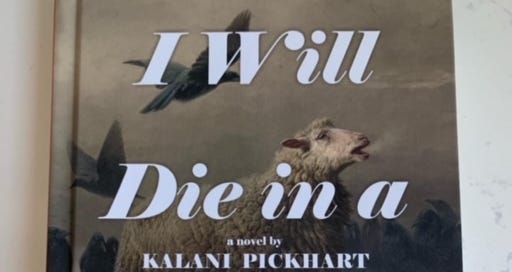'I Will Die in a Foreign Land' by Kalani Pickhart
'Some news said it was an accident, but there are no accidents in Ukraine. Just consequences.'—Review #181

I wasn’t looking for a book related to Russia’s invasion of Ukraine when I selected Kalani Pickhart’s debut novel from my bedside pile. Honestly, I ordered it earlier this year from Two Dollar Radio based on some buzz I heard about it and the Olga Tokarczuk / Ottessa Moshfegh vibes I get from the title and cover art.
Here’s the cover:
‘I Will Die in a Foreign Land’ opens in Kyiv, Ukraine, in 2014 where protests and violence in the city’s Maidan, or Independence Square, precedes the ouster of the country’s president and Russia’s invasion of Crimea. The story follows several characters: a doctor from the United States who fled a failed marriage following the death of her young son to tend to Kyiv’s wounded in St. Michael’s Monastery; a former KGB agent with a secret (actually, several secrets); a former mining engineer who seeks love and purpose amid the conflict; and an activist whose bisexuality and relationships with journalists (male and female) puts her at risk. Their lives intersect in unexpected ways to show:

This is the kind of novel where in order to explain it, I’d need to tell you the whole thing and ruin it. So I won’t do that. But I will reveal that the narrative jumps forward and backward in time, as well as across locations. We see Kyiv, Los Angeles and Boston in 2014, but also Prague in the 1960s and Chernobyl in the 1980s. In addition, cut into the narrative are news articles, bits of history and songs, audio and video transcripts, a list of 100 Ukrainians who were killed during the Maidan protests and the passenger manifest of Malaysia Airlines Flight MH17 that was shot down over Ukraine in 2014 on its way from Amsterdam to Kuala Lumpur. It’s not straightforward or linear storytelling, but it coheres and:

I love when authors tinker with structure. Pickhart’s story deemphasizes the sequence of political events to focus on the humanity of those who get caught up in them. We feel the pain of a truncheon blow from Ukraine’s Berkut special police, the anxiety when a friend is disappeared by unknown forces and the conflict within a spy forced to betray their people while also trying to save them. ‘I Will Die in a Foreign Land’ carries substantial emotional weight, and I’m glad the universe put it in my hands. It is crisply written, and I flew through the book. It also has helped me to understand better the context behind Russia’s recent invasion of Ukraine and the ongoing war. If you’re up for a novel that’s as unique as it is of the moment, you should read this book.
How it begins:
Where does it begin? Ah, ah. Depends on who you ask—
It could begin with Scythians and Cimmerians, Slavs and the Rus’. Queen Olha. Vladymyr the Great. Yaroslav the Wise.
It could begin with Kyi. Ilya Muromets. The Kozaks, the UNR, the UPA. One thing is certain: it doesn’t just begin here, my friend. It doesn’t begin or end with Stalin. It doesn’t begin or end with Yanukovych. Or Poroshenko. Or Zelenzky. It doesn’t begin or end with Putin.
The war has always been quiet: like a pulse, it can be forgotten. Unnoticed. Like a pulse, we can feel it as long as we’re still here.
My rating:

‘I Will Die in a Foreign Land’ by Kalani Pickhart was published by Two Dollar Radio in 2021. 300 pages. $21.95 at Two Dollar Radio.
Spoiler thread:
If you want to discuss plot points and character choices, meet me in the comments by clicking this button:
What’s next:
Before you go:
ICYMI: Review #180
Do this: Kalani Pickhart is scheduled to participate in a virtual reading as part of the Small Press Book Fair on March 23 at 7:30 p.m. Click here for details.
Read this: ‘My Very Romantic, Totally Normal “American Psycho” Dinner for Two’ in Mel Magazine by essayist and James Beard Award-nominated food writer Rax King is pretty hilarious. In the piece, King makes a three-course meal based entirely on dishes mentioned in Bret Easton Ellis’s famed novel that’s ‘a book I do not like,’ she says. The peanut butter soup with smoked duck and mashed squash sounds pretty good, but I’m torn about the swordfish meatloaf.
Thanks for reading, and thanks especially to Donna for editing this newsletter!
Until next time,

MPV









This is a novel that, by its face or apparent premise, I would likely never pick up on my own. Thanks for changing that. I was surprised in particular by how it begins, how lyrical and engaging it is: "The war has always been quiet: like a pulse, it can be forgotten. Unnoticed. Like a pulse, we can feel it as long as we’re still here." And it rings so true, now.
Ooh. I will have to check this out. Two Dollar Radio is doing some cool stuff.